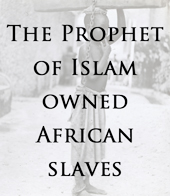TheReligionofPeace
|
|
TROP is a non-political, fact-based site which examines
the ideological threat that Islam poses to human dignity and freedom
|
|
|
Jihad Report
Feb 14, 2026 -
Feb 20, 2026
|
| Attacks |
25
|
| Killed |
126
|
| Injured |
78
|
| Suicide Blasts |
1
|
| Countries |
5
|
|

|
Jihad Report
January, 2026
|
| Attacks |
164
|
| Killed |
677
|
| Injured |
420
|
| Suicide Blasts |
4
|
| Countries |
19
|
|
List of Attacks
|
|
|
It's much easier to act as if critics of Islam have a problem with Muslims as people than
it is to accept the uncomfortable truth that Islam is different
|
|
|
|

|

|
|
|

What can we learn about
Islam from this woman?
|
|
|
|





